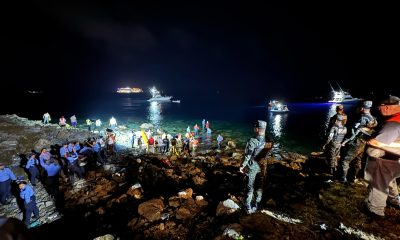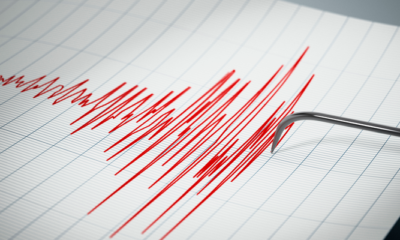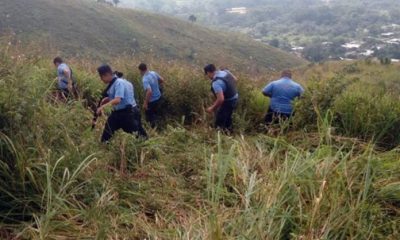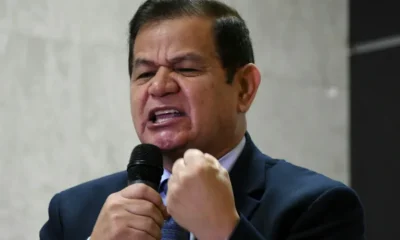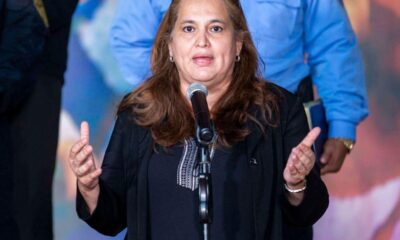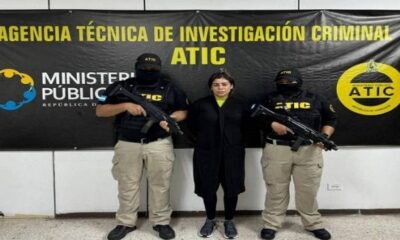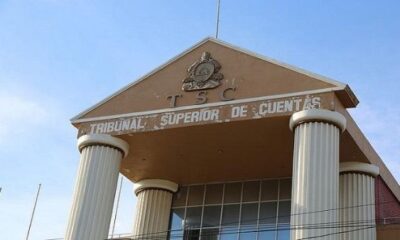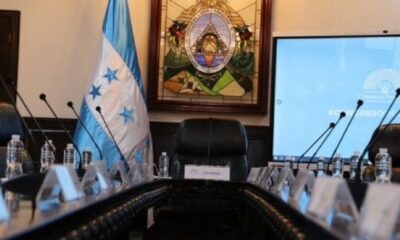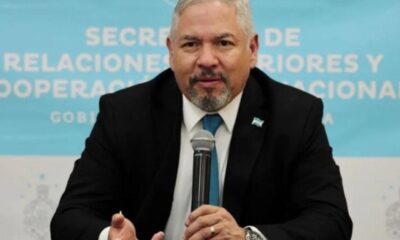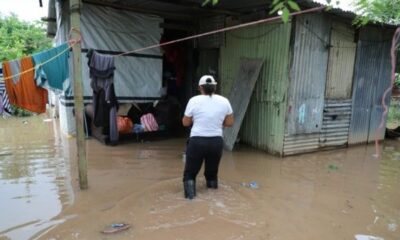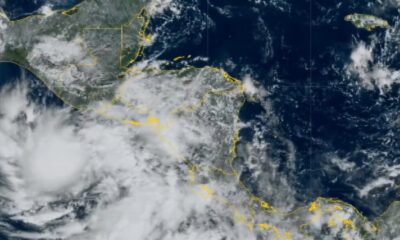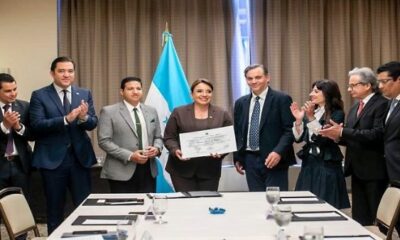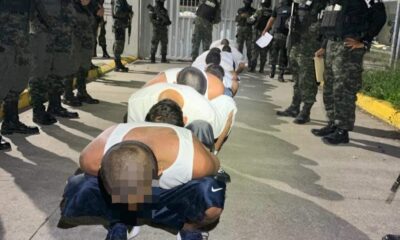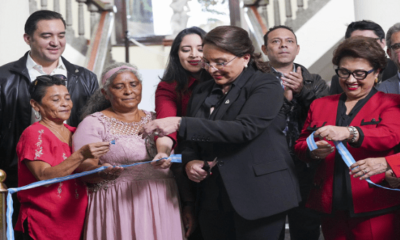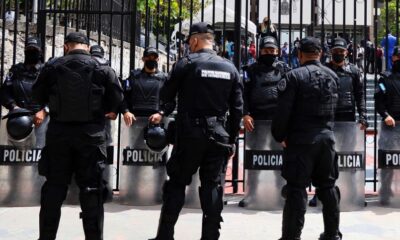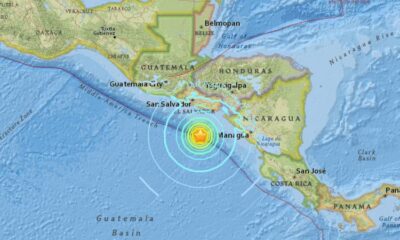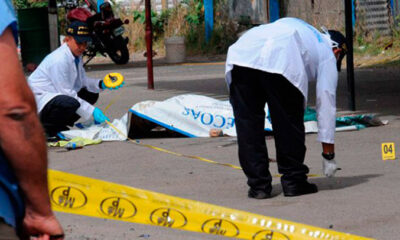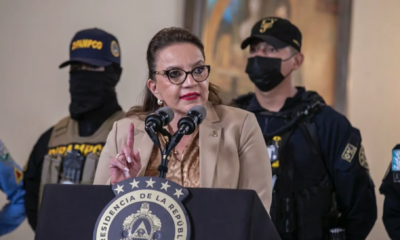Central America
Former president of Honduras found guilty of drug trafficking by U.S. justice
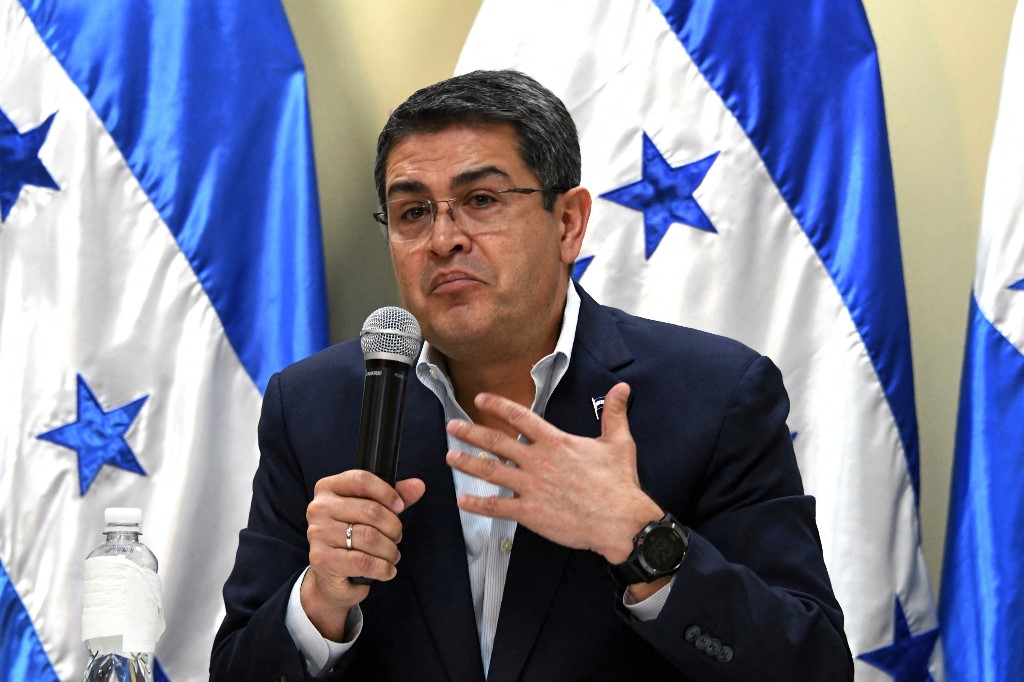
The prosecution, alleging that the former president created a narco-state during his presidency (2014-2022), accused him of conspiring to traffic drugs to the United States, as well as conspiring to traffic arms, offenses that carry potential life sentences.
Former President of Honduras, Juan Orlando Hernández, was declared guilty of drug trafficking and arms trafficking by a federal jury in New York on Friday, concluding a landmark trial that could see him spend the rest of his life in prison.
On its second day of deliberations, the 12-member jury announced its unanimous verdict shortly before 13:30 local time, finding Hernández guilty on all three charges brought by the prosecution.
“I am innocent, tell the world, I love you,” Hernández said as he left the court, addressing his family, including two sisters-in-law, and the three generals who came to testify on his behalf in this trial.
Flanked by his lawyers, moments before Judge Kevin Castel called the parties to hear the verdict, 55-year-old Hernández appeared to be praying.
Afterwards, he reacted to the verdict by shaking his head in disbelief as the jury spokesperson responded to each of the judge’s questions to establish his guilt.
The prosecution, asserting that the former president created a narco-state during his presidency (2014-2022), accused him of conspiring to traffic drugs to the United States, as well as conspiring to traffic arms, offenses that carry potential life sentences.
The judge is yet to announce the former president’s sentence in the coming weeks or months.
According to the U.S. prosecution, Hernández participated in and protected a network that sent over 500 tons of cocaine to the United States between 2004 and 2022, while he was a congressman, president of the Congress, and later president of the Republic. In exchange, he allegedly received millions of dollars from cartels, including Mexican drug trafficker Joaquín “El Chapo” Guzmán, who was sentenced to life in prison in the United States.
Extradited in April 2022 to the United States, three months after handing over the presidency to leftist successor Xiomara Castro, the convicted individual is known for the infamous phrase “We are going to put the drugs in their noses (to the Americans) and they won’t even notice,” according to a witness.
Asked by AFP, defense attorney Renato Stabile, with tears in his eyes, said that “obviously the verdict is harsh, but mentally, he is very strong.”
This staunch ally of Republican President Donald Trump (2017-2021) once boasted about Washington’s praise for his government’s efforts in the fight against drug trafficking.
Prosecutor Jacob H. Gutwillig reminded the jury that while the accused publicly promoted laws against drug trafficking and the extradition of drug lords to the United States, he also met with U.S. officials behind closed doors. However, “none of this undoes what the accused did behind closed doors.”
“He is a drug trafficker,” Gutwillig concluded.
Since 2014, Honduras has extradited 38 people accused of drug trafficking to the United States. Others surrendered to U.S. authorities or were arrested outside the country.
Former police chief Juan Carlos “Tigre” Bonilla and former police officer Mauricio Hernández, who were to be tried with the former president, pleaded guilty to drug trafficking a few days before the trial began. Their sentences will be announced in the coming months.
Many of the dozen witnesses presented by the prosecution highlighted the corruption and close ties between politics and drug trafficking.
“The political elite, which is also the economic elite, has operated in complete impunity” over the past 15 years, since the 2009 coup, emboldened by “the support it received from foreign governments despite knowing that it was heavily involved in drug trafficking,” says American activist Karen Spring of the Honduras Solidarity Network to AFP.
“All state institutions are heavily penetrated by drug trafficking, particularly the police and the military,” she asserts.
Extradited in April 2022, three months after leaving office, the former president will follow in the footsteps of his brother Tony Hernández and Geovanny Fuentes, a close associate of his brother, who are serving life sentences in the United States, as well as Fabio Lobo, son of former President Porfirio Lobo (2010-2014), and lawmaker Fredy Renán Nájera, all convicted of drug trafficking.
Central America
Guatemala Police Arrest Prison Guard Caught in the Act of Extortion
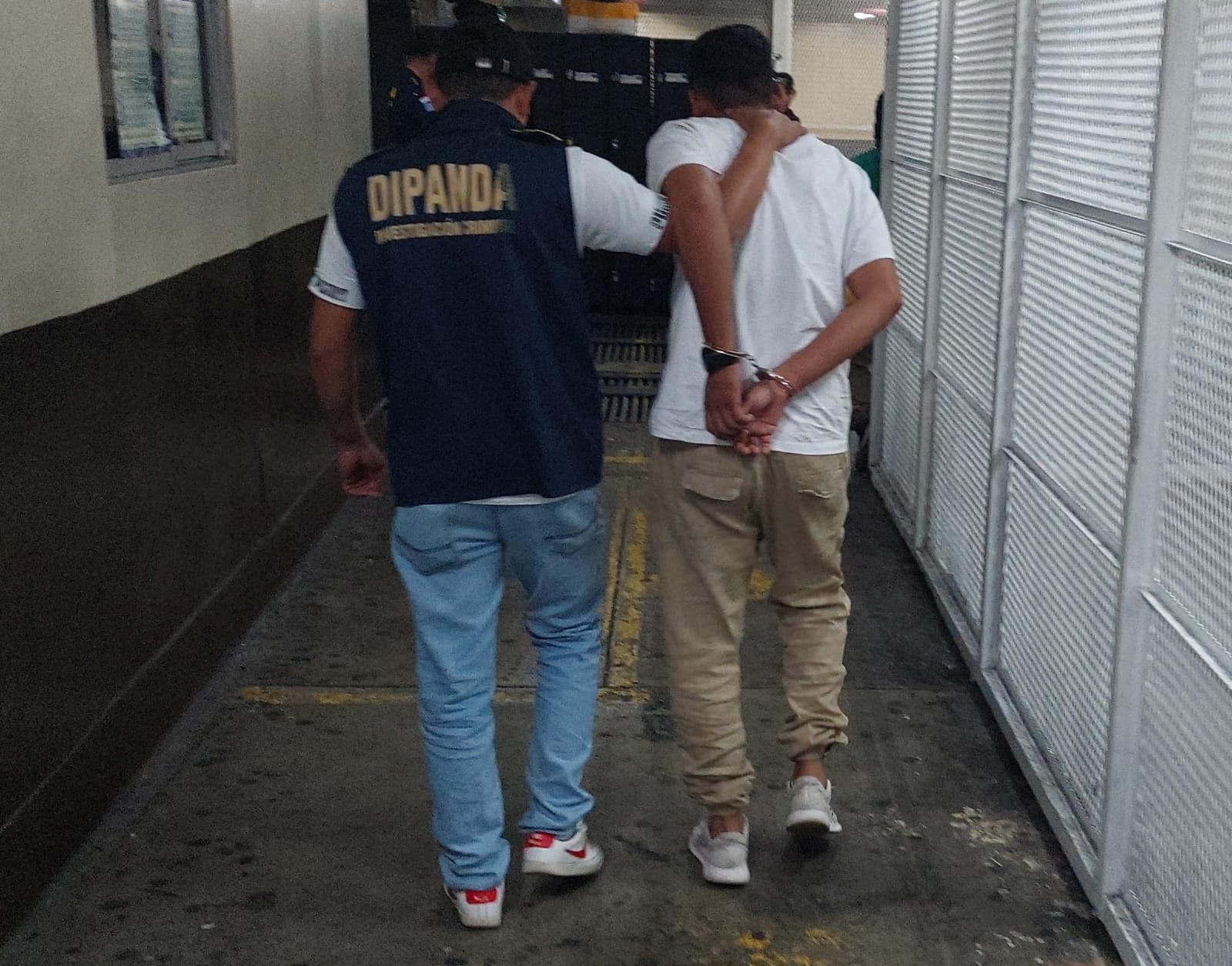
Guatemala’s National Civil Police (PNC) arrested a suspected extortionist in the act during an operation carried out in the department of Quiché, authorities reported.
According to the police report, the arrest took place in Zone 1 of Santa Cruz del Quiché after officers responded to a citizen complaint. Agents from Precinct 71 identified the suspect as Encarnación “N”, 41, who was serving as a guard in the Guatemalan Penitentiary System.
The suspect was caught while attempting to collect a package simulating an extortion payment totaling 25,000 quetzales. Police intervened at the precise moment the money was being handed over, allowing authorities to document the crime in flagrante delicto.
Following the operation, the detainee was placed at the disposal of the competent courts to face criminal proceedings.
The PNC emphasized that such operations aim to dismantle criminal structures involved in extortion, regardless of whether those implicated are linked to state institutions, and urged the public to continue reporting these crimes through confidential channels.
Central America
Honduras swears in conservative president Asfura after disputed election

Conservative politician Nasry Asfura assumed the presidency of Honduras on Tuesday with an agenda closely aligned with the United States, a shift that could strain the country’s relationship with China as he seeks to confront the economic and security challenges facing the poorest and most violent nation in Central America.
Asfura’s rise to power, backed by U.S. President Donald Trump, marks the end of four years of left-wing rule and secures Trump another regional ally amid the advance of conservative governments in Chile, Bolivia, Peru, and Argentina.
The 67-year-old former mayor and construction businessman was sworn in during an austere ceremony at the National Congress, following a tightly contested election marred by opposition allegations of fraud and Trump’s threat to cut U.S. aid if his preferred candidate did not prevail.
Grateful for Washington’s support, Asfura—who is of Palestinian descent—traveled to the United States to meet with Secretary of State Marco Rubio, before visiting Israeli Prime Minister Benjamin Netanyahu.
“We need to strengthen relations with our most important trading partner,” Asfura said after being declared the winner of the November 30 election by a narrow margin, following a tense vote count that lasted just over three weeks.
Central America
Bukele leads public trust rankings as UCA survey highlights gains in security
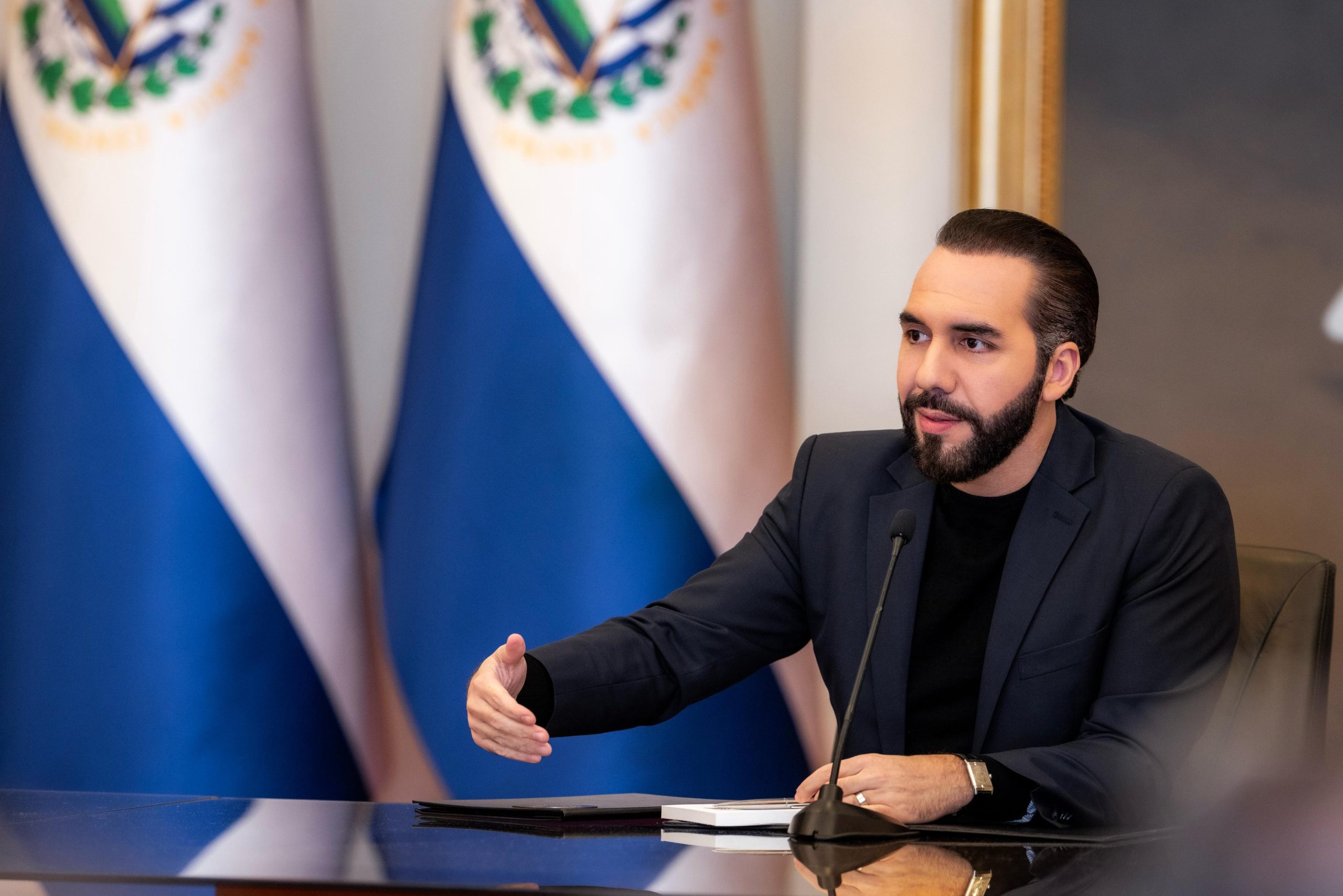
Results from the UCA Survey, conducted by the José Simeón Cañas Central American University (UCA), were presented on Tuesday, offering an assessment of the performance of the Government of El Salvador during 2025 and measuring public perception on key issues such as security and the economy.
According to the survey, President Nayib Bukele received an average score of 8.39 for his performance in 2025. In the category measuring levels of trust in national institutions and social actors, Bukele led the ranking with 77% public confidence, surpassing the Central Government (69.6%), the Armed Forces (69.1%), the National Civil Police (PNC), and the Catholic Church (58.4%), among others.
The survey also highlights an upward trend in the president’s evaluation. While Bukele scored 8.15 for his performance in 2024, the most recent assessment of his sixth year in office showed an increase to 8.39.
Meanwhile, the Government of El Salvador as a whole was rated 8.33 for its performance during 2025.
Respondents identified public security as the area showing the greatest progress in the country, with 62.7% recognizing improvements in this sector, according to the UCA survey released on Tuesday.
-

 Central America4 days ago
Central America4 days agoGuatemala’s president rules out negotiations with inmates after prison riots
-

 International3 days ago
International3 days agoTrump-Era Defense Plan Prioritizes Border Security and Scales Back Global Commitments
-

 Internacionales4 days ago
Internacionales4 days agoMajor winter storm threatens “catastrophic” ice and snow across much of the U.S.
-

 Central America1 day ago
Central America1 day agoGuatemala seizes over a ton of cocaine hidden in flour at Pacific port
-

 International3 days ago
International3 days agoBogotá and Quito Seek Dialogue After Tariffs and Power Cut Escalate Tensions
-

 International4 days ago
International4 days agoGuatemala considers sending high-risk gang members to military prisons
-

 International2 days ago
International2 days agoDelcy Rodríguez seeks political agreements after Maduro’s ouster
-

 International1 day ago
International1 day agoHistoric snowstorm paralyzes Toronto after 60 centimeters of snow
-

 International2 days ago
International2 days agoFederal immigration agents kill man in Minneapolis, sparking protests and outrage
-

 International4 days ago
International4 days agoRights group says over 5,000 killed in Iran protests, mostly civilians
-

 International1 day ago
International1 day agoSpain’s irregular migrant population rises to 840,000, study finds
-

 International1 day ago
International1 day agoRights group says nearly 6,000 killed in Iran protest crackdown
-

 International1 day ago
International1 day agoVenezuela frees at least 80 political prisoners, NGO says
-

 International1 day ago
International1 day agoEU launches new probe into X over AI-generated fake nude images
-

 International1 day ago
International1 day agoSevere winter storm grips U.S., leaves multiple dead as extreme cold persists
-

 International1 day ago
International1 day agoFrance debates ban on social media for children under 15
-

 Central America19 minutes ago
Central America19 minutes agoHonduras swears in conservative president Asfura after disputed election
-

 Sin categoría15 minutes ago
Sin categoría15 minutes agoEl Salvador Launches Fourth Year of Ocean Mission to Protect Marine Ecosystems
-

 Central America27 minutes ago
Central America27 minutes agoBukele leads public trust rankings as UCA survey highlights gains in security
-

 International21 minutes ago
International21 minutes agoDoomsday clock moves to 85 seconds before midnight amid rising global risks
-

 International17 minutes ago
International17 minutes agoSpain approves plan to regularize up to 500,000 migrants in Historic Shift
-

 International10 minutes ago
International10 minutes agoWinter Storm Fern Leaves 30 Dead and Over One Million Without Power Across the U.S.
-

 Central America8 minutes ago
Central America8 minutes agoGuatemala Police Arrest Prison Guard Caught in the Act of Extortion
-

 Sin categoría4 minutes ago
Sin categoría4 minutes agoEight Killed in Series of Armed Attacks in Ecuador’s Manabí Province



























